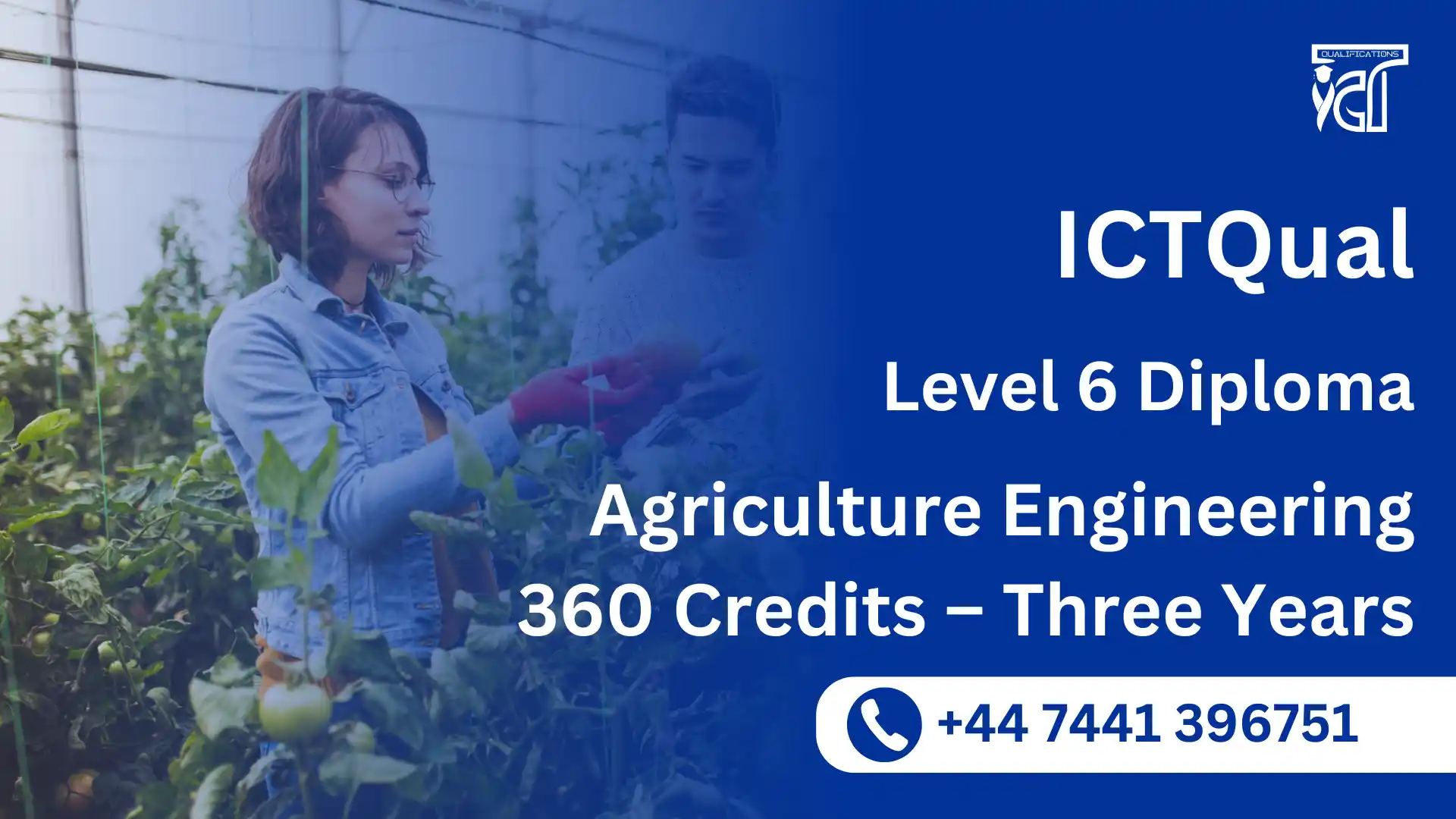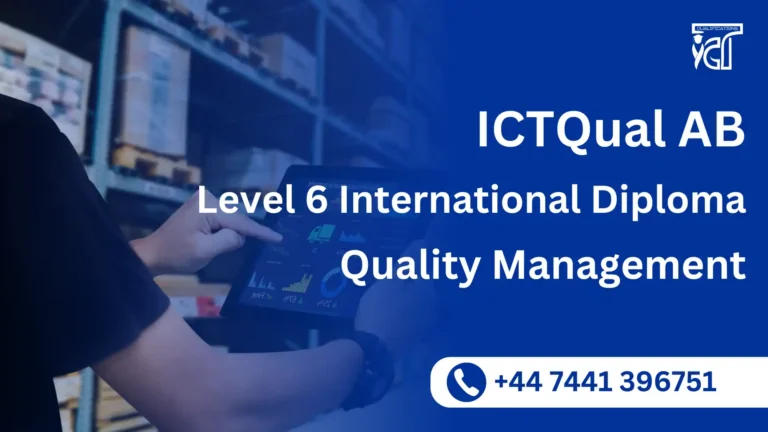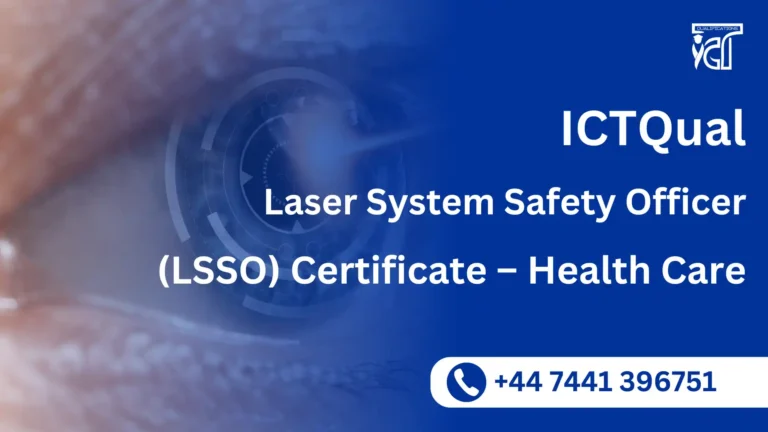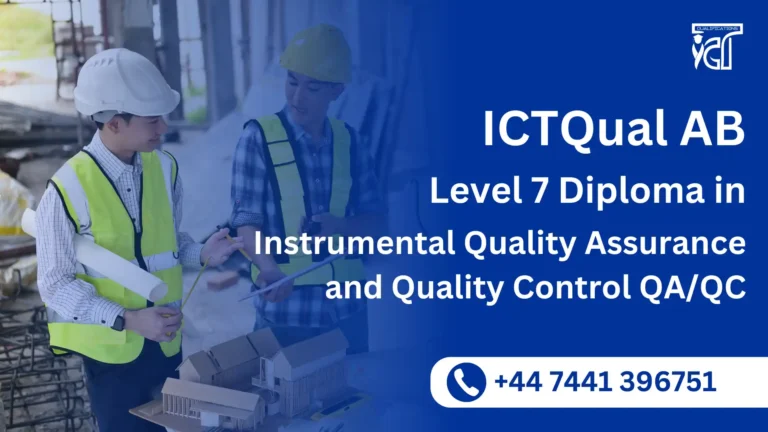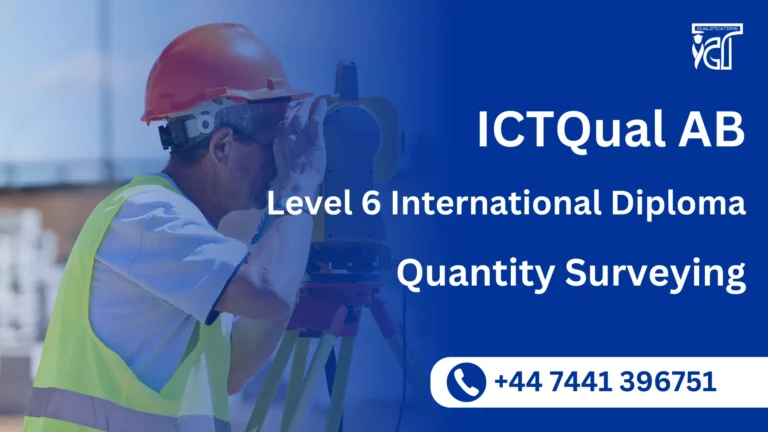The ICTQual Level 6 Diploma in Agriculture Engineering 360 Credits – Three Years is a comprehensive three-year programme designed to equip learners with advanced technical knowledge and practical skills for the agricultural and agritech industries. Structured around a 360-credit framework, this diploma provides in-depth understanding of agricultural machinery, irrigation systems, sustainable farming technologies, soil and water management, and emerging innovations in precision agriculture. It is ideal for both freshers entering the field and professionals seeking to enhance their expertise or progress into specialised and managerial roles.
Learners undertaking this programme will develop expertise in areas such as farm machinery design, crop production systems, irrigation and drainage, renewable energy applications in agriculture, and automation technologies. Through hands-on projects, laboratory work, and field-based studies, learners gain the competence and confidence to optimise agricultural operations, implement sustainable practices, and solve complex engineering challenges. The programme also strengthens analytical thinking, problem-solving, and project management skills, preparing learners to meet industry demands effectively.
Upon successful completion, learners can pursue careers as agricultural engineers, farm machinery specialists, irrigation system designers, agricultural project managers, or technical consultants in the agritech and farming sectors. The diploma also prepares learners for leadership positions, enabling them to manage agricultural projects, implement innovative solutions, and drive operational efficiency in farming enterprises and agribusinesses.
Key benefits of the programme include mastery of advanced agricultural engineering principles, hands-on experience with machinery and irrigation systems, enhanced employability, development of analytical and project management skills, and preparation for technical and managerial roles within the agricultural sector. Whether learners are beginning their professional journey or advancing their existing expertise, the ICTQual Level 6 Diploma in Agriculture Engineering provides a strong foundation for long-term career success and global opportunities in modern agriculture.
ICTQual Level 6 Diploma in Agriculture Engineering 360 Credits – Three Years
This qualification, the ICTQual Level 6 Diploma in Agriculture Engineering 360 Credits – Three Years, consists of 36 mandatory units.
Year 1: Foundational Knowledge
- Introduction to Agricultural Engineering
- Basics of Soil Science
- Plant Science and Crop Physiology
- Introduction to Farm Machinery
- Principles of Irrigation and Drainage
- Environmental Science in Agriculture
- Mathematics for Engineers
- Fundamentals of Agricultural Economics
- Introduction to Renewable Energy in Agriculture
- Agricultural Chemistry
- Engineering Drawing and CAD
- Workshop Practices in Agricultural Engineering
Year 2: Intermediate Concepts and Applications
- Advanced Soil and Water Management
- Farm Power and Mechanization
- Agricultural Structures and Materials
- Irrigation Systems Design
- Introduction to Precision Agriculture
- Agricultural Waste Management
- Crop Protection Technologies
- Advanced Farm Machinery Operations
- Principles of Agro-Processing
- Renewable Energy Technologies in Agriculture
- Land Surveying and Mapping
- Practical Training in Agricultural Engineering
Year 3: Advanced Studies and Specialization
- Sustainable Agriculture Practices
- Advanced Irrigation and Drainage Engineering
- Farm Business Management
- Design of Agricultural Machinery
- Precision Farming Systems
- Advanced Soil Mechanics
- Climate-Smart Agriculture
- Renewable Energy Systems for Farms
- Post-Harvest Technology
- Automation in Agriculture
- Research Methods in Agriculture Engineering
- Final Project in Agricultural Engineering
Learning Outcomes for the Level 6 Diploma in Agriculture Engineering 360 Credits – Three Years:
Year 1: Foundational Knowledge
Introduction to Agricultural Engineering
- Understand the role of agricultural engineering in modern farming
- Learn the basic principles and applications of agricultural engineering in crop and livestock production
Basics of Soil Science
- Identify different soil types and their properties
- Understand soil fertility and its management in agricultural systems
Plant Science and Crop Physiology
- Grasp the basic physiological processes in plants
- Understand the relationship between plant growth and environmental factors
Introduction to Farm Machinery
- Understand the operation and selection of farm machinery
- Learn basic maintenance and safety practices for farm equipment
Principles of Irrigation and Drainage
- Learn principles and methods of irrigation and drainage
- Understand water management for sustainable crop production
Environmental Science in Agriculture
- Understand the impact of agriculture on the environment
- Learn about sustainable practices and environmental protection
Mathematics for Engineers
- Apply mathematical techniques to solve agricultural engineering problems
- Develop skills in algebra, calculus, and statistics
Fundamentals of Agricultural Economics
- Understand economic principles in agricultural systems
- Learn concepts of supply, demand, and cost-benefit analysis in farming
Introduction to Renewable Energy in Agriculture
- Learn about renewable energy sources and their applications in agriculture
- Understand principles of solar, wind, and bioenergy for farm operations
Agricultural Chemistry
- Understand chemical processes involved in agriculture
- Learn the role of fertilizers, pesticides, and soil amendments
Engineering Drawing and CAD
- Learn to interpret and create technical drawings and schematics
- Develop skills in using CAD software for agricultural engineering design
Workshop Practices in Agricultural Engineering
- Gain practical skills in using tools and machinery
- Understand safety protocols and workshop procedures
Year 2: Intermediate Concepts and Applications
Advanced Soil and Water Management
- Apply advanced techniques in soil and water conservation
- Manage water resources for optimal agricultural production
Farm Power and Mechanization
- Learn principles of farm power systems
- Understand operation and integration of mechanized systems
Agricultural Structures and Materials
- Understand design and construction of agricultural structures (barns, greenhouses)
- Learn about materials used in agricultural building design
Irrigation Systems Design
- Learn design principles for efficient irrigation systems
- Apply knowledge of soil, climate, and crop requirements to develop irrigation plans
Introduction to Precision Agriculture
- Understand the role of technology in precision farming
- Learn how data-driven decisions improve crop management
Agricultural Waste Management
- Understand management and recycling of agricultural waste
- Learn methods of reducing waste and converting it into useful products
Crop Protection Technologies
- Learn about pest and disease management techniques
- Understand use of crop protection chemicals and biological controls
Advanced Farm Machinery Operations
- Develop advanced skills in operating complex farm machinery
- Learn maintenance practices to increase lifespan and efficiency
Principles of Agro-Processing
- Understand processes involved in transforming raw agricultural products
- Learn about food and fiber processing technologies
Renewable Energy Technologies in Agriculture
- Learn about renewable energy technologies and their applications
- Understand design and integration of energy systems on farms
Land Surveying and Mapping
- Develop skills in surveying land for agricultural projects
- Learn to create maps and use GIS for agricultural purposes
Practical Training in Agricultural Engineering
- Apply theoretical knowledge in real-world scenarios
- Gain hands-on experience with machinery, tools, and technology
Year 3: Advanced Studies and Specialization
Sustainable Agriculture Practices
- Understand principles of sustainable farming and environmental stewardship
- Learn techniques for increasing farm productivity while minimizing environmental impact
Advanced Irrigation and Drainage Engineering
- Apply advanced techniques in irrigation and drainage systems
- Solve complex water management problems in large-scale agriculture
Farm Business Management
- Understand financial and operational aspects of running a farm
- Develop business plans, manage finances, and analyze profitability
Design of Agricultural Machinery
- Learn the process of designing agricultural machinery and equipment
- Select materials, components, and technologies for machinery design
Precision Farming Systems
- Understand integration of precision technologies in farming systems
- Design and implement precision farming solutions
Advanced Soil Mechanics
- Apply principles of soil mechanics in agricultural applications
- Learn techniques for improving soil structure and managing compaction
Climate-Smart Agriculture
- Understand how agriculture adapts to and mitigates climate change
- Build strategies for climate resilience in farming systems
Renewable Energy Systems for Farms
- Design renewable energy systems (solar, wind, biomass) for agricultural operations
- Assess feasibility and sustainability of renewable energy on farms
Post-Harvest Technology
- Understand post-harvest handling, storage, and processing principles
- Learn techniques to minimize losses and preserve crop quality
Automation in Agriculture
- Learn about automation and robotics in farming
- Understand how automation improves efficiency in planting, harvesting, and processing
Research Methods in Agricultural Engineering
- Develop skills in conducting agricultural engineering research
- Learn experimental design, data analysis, and research presentation techniques
Final Project in Agricultural Engineering
- Apply knowledge from previous years to design and implement a practical project
- Demonstrate problem-solving, innovation, and research skills on real-world challenges
The ICTQual Level 6 Diploma in Agriculture Engineering provides learners with the technical knowledge, practical skills, and industry insights required to excel in modern agriculture and agritech sectors. The programme equips learners to address challenges in crop production, farm mechanisation, irrigation, renewable energy integration, and sustainable farming. By combining theoretical understanding with hands-on experience, learners gain the competence needed to improve productivity, implement innovative solutions, and take on leadership or specialist roles in agricultural engineering.
Advanced Technical Expertise
- Master key principles of agricultural engineering, including farm machinery design, soil and water management, irrigation systems, and precision farming
- Gain proficiency in renewable energy systems, automation, and agro-processing technologies
- Develop practical skills for designing and implementing efficient agricultural solutions
Practical and Hands-On Learning
- Apply knowledge through field projects, laboratory experiments, and practical workshops
- Gain experience operating and maintaining advanced farm machinery and equipment
- Develop problem-solving skills for real-world agricultural engineering challenges
Career Progression and Employability
- Prepare for roles such as Agricultural Engineer, Farm Machinery Specialist, Irrigation System Designer, or Agricultural Project Manager
- Enhance professional credibility and employability within agricultural, agritech, and environmental sectors
- Build a foundation for managerial, technical consultancy, or specialised positions
Leadership and Project Management Development
- Develop project management skills relevant to agricultural engineering projects
- Learn to lead teams, coordinate resources, and manage budgets effectively
- Strengthen decision-making, communication, and leadership capabilities
Global and Industry-Relevant Opportunities
- Understand international agricultural engineering standards and sustainable practices
- Access career opportunities in global agricultural, food processing, and agritech industries
- Acquire transferable skills for contributing to innovative projects and environmentally sustainable solutions
The ICTQual Level 6 Diploma in Agriculture Engineering is designed for learners who are motivated to build a successful career in modern agriculture and agritech industries. This programme caters to both freshers entering the field and professionals seeking to upskill, specialise, or advance into managerial roles. Learners should have a strong interest in agricultural technologies, sustainability, and farm mechanisation, and be committed to gaining both theoretical knowledge and practical expertise.
Aspiring Agricultural Engineers
- Fresh learners aiming to enter the agricultural engineering field
- Individuals seeking foundational knowledge in farm machinery, irrigation, renewable energy, and precision agriculture
- Learners interested in hands-on experience with agricultural systems and practical fieldwork
Experienced Professionals Seeking Advancement
- Technicians or engineers looking to enhance their qualifications and technical expertise
- Professionals aiming to move into supervisory, specialist, or managerial roles in agritech, farming, or agro-industrial sectors
- Learners seeking formal recognition of existing skills and experience
Career Switchers
- Individuals from related engineering, environmental, or agricultural backgrounds seeking to transition into agricultural engineering
- Learners interested in acquiring formal certification to validate their knowledge and competencies
- Those aiming to broaden their technical expertise for diverse agricultural applications
Lifelong Learners
- Professionals committed to continuous learning, upskilling, and staying updated with emerging agricultural technologies
- Individuals seeking to strengthen problem-solving, research, and project management skills
- Learners motivated to contribute to sustainable and climate-smart agriculture solutions
Globally-Oriented Professionals
- Learners aspiring to work in international agricultural, agritech, or agro-industrial organisations
- Individuals seeking transferable skills applicable across multiple countries and sectors
- Professionals interested in contributing to innovative, sustainable, and technology-driven agricultural projects
Completing the ICTQual Level 6 Diploma in Agriculture Engineering equips learners with the technical expertise, practical skills, and leadership capabilities needed to excel in modern agriculture and agritech industries. Graduates can access a wide range of career and academic pathways, both locally and internationally, enabling long-term professional growth and global opportunities.
Technical and Specialist Roles
- Work as an Agricultural Engineer, Irrigation System Designer, or Farm Machinery Specialist
- Apply expertise in soil and water management, renewable energy systems, and precision agriculture
- Take responsibility for designing, implementing, and maintaining advanced agricultural systems
Project Management and Leadership Opportunities
- Transition into project management roles overseeing agricultural engineering projects
- Lead teams, coordinate resources, and manage budgets for farm operations and agritech initiatives
- Develop leadership, communication, and decision-making skills essential for managerial positions
Specialisation in Advanced Agricultural Fields
- Gain expertise in automation, climate-smart agriculture, agro-processing, and sustainable farming practices
- Pursue specialist roles in farm technology, post-harvest systems, and agritech consultancy
- Apply advanced knowledge to implement innovative solutions and improve farm productivity
Academic and Professional Advancement
- Use the diploma as a foundation for postgraduate studies or professional certifications in agriculture, agritech, or environmental engineering
- Access research and advanced training opportunities to deepen knowledge and expertise
- Strengthen professional credentials for career mobility and international recognition
Global Career Opportunities
- Access international positions in agricultural engineering, agro-industrial operations, renewable energy integration, and consultancy
- Apply transferable skills to contribute to global projects and innovative farming solutions
- Enhance employability in diverse agricultural, agritech, and environmental sectors, supporting sustainable and technology-driven practices
Route 1: For Experienced Candidates
This route is tailored for learners who already have substantial work experience in agriculture or agricultural engineering.
- Eligibility: Learners must have at least six years of verifiable experience in agricultural engineering, farm management, or a related technical field.
- Competency Assessment: Learners are not required to complete the full training programme. Our ICTQual Approved Training Centre will assess whether their existing skills and knowledge meet the learning outcomes of the diploma.
- Evidence Submission: Candidates must provide documentation verifying their experience, including roles, responsibilities, and tasks aligned with agricultural engineering principles.
- Knowledge Verification: Centres ensure learners are familiar with all course learning outcomes. Additional guidance or targeted learning may be provided if gaps are identified.
- Certification: Upon successful verification, learners will be awarded the ICTQual Level 6 Diploma in Agriculture Engineering without completing the full programme.
Route 2: For Fresh Learners
This route is suitable for individuals who are new to agricultural engineering and have no prior experience.
- Admission: Learners must enrol through our ICTQual Approved Training Centre to access study materials, practical sessions, and assessment support.
- Training: Fresh learners complete structured training covering all study units, including theory, practical work, and field-based projects.
- Assignments: Learners are required to complete 36 assignments aligned with the course learning outcomes, ensuring they develop both theoretical knowledge and practical skills.
- Assessment and Certification: Upon successful completion of all assignments and assessments, learners will be awarded the ICTQual Level 6 Diploma in Agriculture Engineering.
Both routes provide a flexible pathway for learners, whether they are experienced professionals seeking formal recognition or fresh entrants aiming to gain comprehensive knowledge and practical expertise in agricultural engineering.
Entry Requirements
Minimum Age
- Learners must be at least 18 years old at the time of enrolment.
Educational Background
- A minimum of high school completion (or equivalent) is required, preferably with a foundation in mathematics, physics, or biology.
- Prior qualifications in agriculture, engineering, or related technical fields are advantageous but not mandatory for fresh learners.
Work Experience
- Experienced Candidates: Must have at least six years of verifiable experience in agricultural engineering, farm management, or related technical roles.
- Fresh Learners: No prior work experience is required; learners will complete the full programme and 36 assignments to achieve the diploma.
Language Proficiency
- Learners must demonstrate proficiency in English, both written and spoken, to effectively engage with course materials, complete assignments, and participate in assessments.
- Standardised English qualifications or internal assessments by the training centre may be required.
Register Now
Qualification Process
Qualification Process for the ICTQual Level 6 Diploma in Agriculture Engineering 360 Credits – Three Years
- Self-Assessment:
Begin by evaluating your eligibility to ensure you meet the qualification requirements, including work experience, knowledge, and language proficiency. - Registration:
Complete your registration by submitting the required documents, including a scanned copy of a valid ID, and paying the registration fee. - Induction:
An assessor will conduct an induction to confirm your eligibility for the course and explain the evidence requirements. If you do not meet the criteria, your registration will be cancelled, and the fee will be refunded. - Assignments & Evidence Submission:
Provide all assignments and the necessary evidence based on the assessment criteria outlined in the course. If you are unsure of the required evidence, consult with the assessor for guidance on the type and nature of evidence needed. - Feedback and Revision:
The assessor will review your submitted evidence and provide feedback. Evidence that meets the criteria will be marked as “Criteria Met,” while any gaps will be identified. You will be asked to revise and resubmit if needed. - Competence Evidence:
Submit final evidence demonstrating that all learning outcomes have been met. This evidence will be marked as “Criteria Met” by the assessor once it is satisfactory. - Internal Quality Assurance (IQA):
The Internal Quality Assurance Verifier (IQA) will review your evidence to ensure consistency, quality, and compliance with standards. - External Verification:
The IQA will submit your portfolio to ICTQUAL AB External Quality Assurance Verifiers (EQA) for final confirmation. The EQA may contact you directly to verify the authenticity of your evidence. - Certification:
Upon successful completion of all checks, ICTQUAL AB will issue your official certificate, confirming that you have attained the ICTQual Level 6 Diploma in Agriculture Engineering 360 Credits – Three Years.

